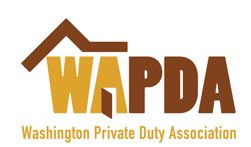WAPDA, the Washington Private Duty Association, is the Washington State chapter of the Home Care Association of America. As a founding board member and current president, I’m in a good position to see the landscape of not only the state of home care and home care agencies in Washington, but of long-term care in general. And from where I sit, the landscape is changing for home care, perhaps dramatically.
What are those changes and how can WAPDA help member agencies prepare for the future? In May, I spoke about four of these changes at the WAPDA Annual Conference. Here are two of the issues discussed, and I’ll write about two others (saving the most challenging for last) in a later posting.
1) Washington State Initiative 1163. Passed by the voters in November 2010, the initiative mandated increased training for long-term care workers, along with testing, certification, increased background checks, and continuing education. Like other nice sounding ideas, the devil was definitely in the details. Many of the predictions we made as to the effects of I-1163 have turned out to be correct – it has become much harder to hire and retain qualified staff and as a result the cost of home care has risen for our elderly clients. There has been no apparent benefit yet from the increased training although there may be some long-term benefit as more new hires are bypassing the new Home Care Aide certification for the much more versatile certification as a Certified Nursing Assistant.
The Bottom Line. Eventually, licensed home care agencies will have better trained caregivers but at an increased cost to elderly clients.
2) Companionship Exemption. The companionship exemption is a federal law that allows caregivers, with some exceptions, to work 24-hour shifts free from minimum wage and overtime requirements. Home care agencies must still meet Washington State minimum wage and overtime requirements which are generally more stringent than federal law. The state does allow an exemption for “sleeping or residing” at one’s workplace which the federal law does not. The Federal Labor Relations Board is close to overturning the Companionship Exemption which, to make a long story short, would dramatically increase the cost and complexity of providing 24-hour live in care to vulnerable and elderly clients.
The Bottom Line. If the exemption is overturned, which could easily happen this fall, families will see the cost of having a live-in caregiver from a licensed home care agency increase significantly.
These two challenges to private duty home care mean that the days when any well-meaning social worker or nurse can hang out their shingle and declare themselves a home care agency are over. Running a home care agency in 2013 requires not only clinical expertise and a compassionate heart, but a first rate business plan. Next month, we will talk about two other even greater challenges, the Patient Protection and Affordable Care Act (Obamacare), and the growing influence of caregiver registries and referral agencies.






